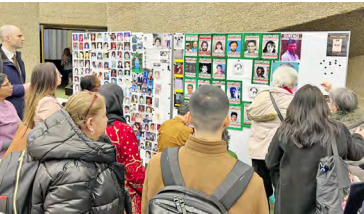

As the issue of abductions and enforced disappearances rages on, global actors now want governments to put up measures to stem the acts and protect survivors.
The call was made during the first world congress on enforced disappearances held in Geneva, Switzerland, between January 15 and 16.
The conference brought together survivors and family members, high-level government representatives, human rights organisations and legal experts.
It came even as a state of the nation security report tabled in Parliament said abductions increased by 44 per cent between September 2023 and August last year.
Coast region is leading with 14 while Nyanza is second with seven, the report said.
About 82 cases of abductions were reported last year according to the Kenya National Human Rights Commission with only 29 resolved.
“Kidnappings and abductions are serious offences under our penal code hence the recent increase of such crimes is of grave concern to the government,” the report said.
“The criminals are often motivated by ransom demands and at times engage in human trafficking.”
The congress, organised by the United Nations Convention on Enforced Disappearances (CEDI) aimed at boosting advocacy on enhancement of legal and institutional frameworks to fight impunity and ensure accountability.
It also called for advocacy of adoption of legislations to make enforced disappearance a separate offence from abduction, kidnapping, disappearance and missing.
The congress wants players to also advocate for adoption of legislation to recognise the status of “disappeared person” and provide family members with a “certificate of absence” while lobbying for the establishment of strong mechanisms to protect victims, including family members and witnesses.
Attendees were also urged to ensure their countries support setting up of international mechanisms to protect against reprisals and lobby for establishment of a nationwide register of disappeared persons.
International Justice Mission Kenya communications and media lead Joseph Kariuki, who attended the congress, said though cases of enforced disappearances are widespread, many go unreported due to insufficient documentation and lack of capacity.
He said there is need for enhancement of civil society groups’ ability to engage with UN mechanisms to boost the fight against the vice.
While highlighting rise in enforced disappearances in Kenya last year following the Gen Z protests, Kariuki said his organisation worked with families of victims.
“On behalf of my organisation, I urge Kenya to ratify the UN convention of enforced and involuntary disappearances, the UN Human Rights office and the convention against enforced disappearances,” he said.
UN Deputy High Commissioner for Human Rights Nada Al-Nashif paid tribute to family members and relatives globally who have persevered in pursuit of truth and justice for their disappeared loved ones.
“Over the past 45 years, the Working Group on Enforced and Involuntary Disappearances has dealt with more than 61,000 cases in 115 states,” she said.
“The Committee on Enforced Disappearances has registered almost 2,000 urgent actions in 30 out of the 77 States parties over the past 13 years. Sadly, this is just the tip of a very large iceberg,” Al-Nashif said.
She said enforced disappearances persist in all parts of the world.
Al-Nashif said escalating conflicts raise the risk of enforced disappearances saying it’s in circumstances of instability, repression and human rights violations that they are more likely to occur.
People are also subjected to enforced disappearance on migration and trafficking routes and in connection with anti-terrorism measures or criminal activities.
“Those who express dissent or expose human rights violations and abuses are often themselves directly targeted,” Al-Nashif said.
“Whether directly by the state or with its knowledge and approval, people are abducted, detained, enslaved, tortured, and mistreated while their loved ones suffer in ignorance of their fate or whereabouts.”
The widespread impunity on enforced disappearances indicates that there is no deterrent for the crime, creating an atmosphere of repression in the society, with searches for loved ones often led by women, the expert said.
While the International Convention for the Protection of All Persons from Enforced Disappearance was adopted in 2006, only 77 States have ratified it.
She said the Committee on Enforced Disappearances and the working group, together with other UN human rights mechanisms have also helped make recommendations to States and provide avenues of support for victims.
“The rights and voices of victims and survivors must guide us, and must remain at the core of all efforts. This crime remains largely un prosecuted.Robust efforts within and between countries to tackle impunity are crucial,” Al-Nashif said.
“States should improve reliable data gathering on disappeared people, ensuring cases are properly identified, to better inform laws, policies, and their implementation. And finally, we must keep pushing, together, for universal ratification and effective implementation of the convention.”













